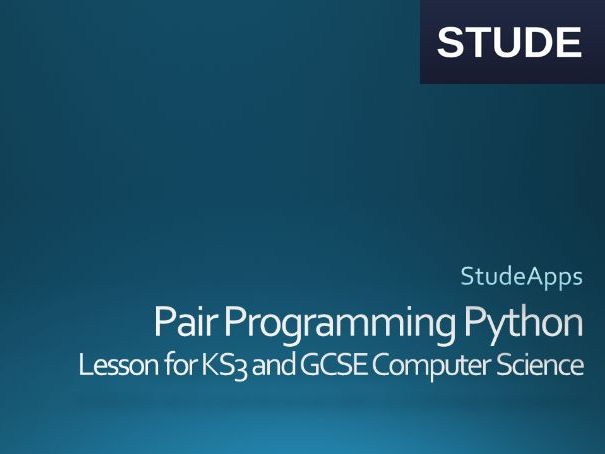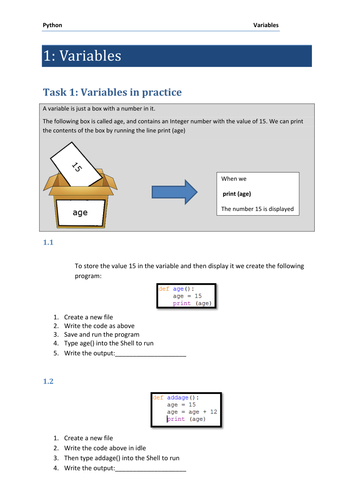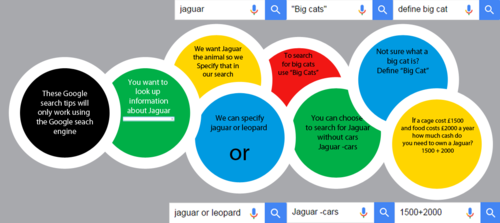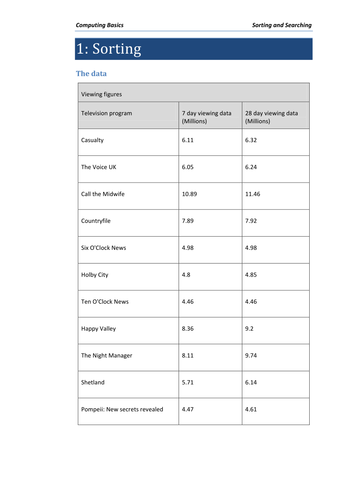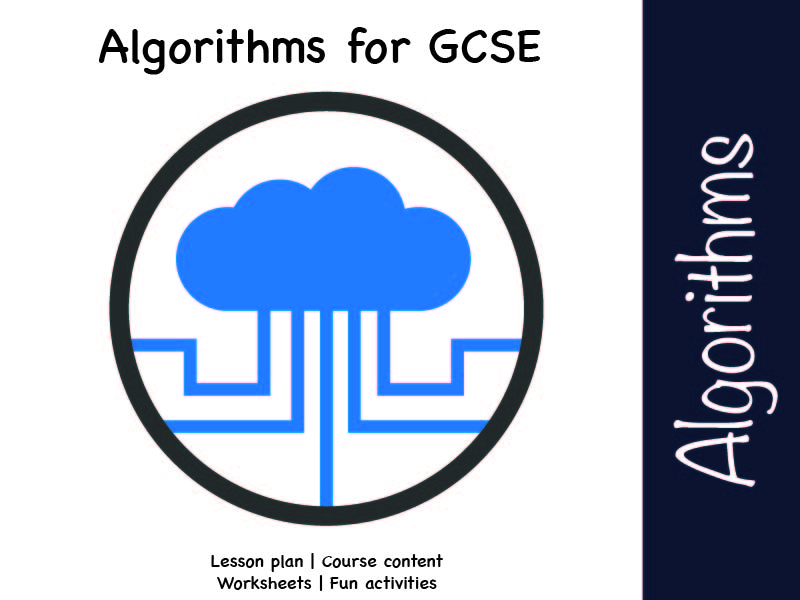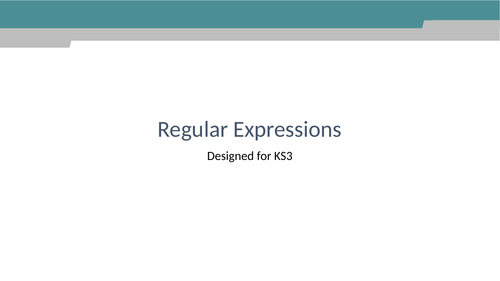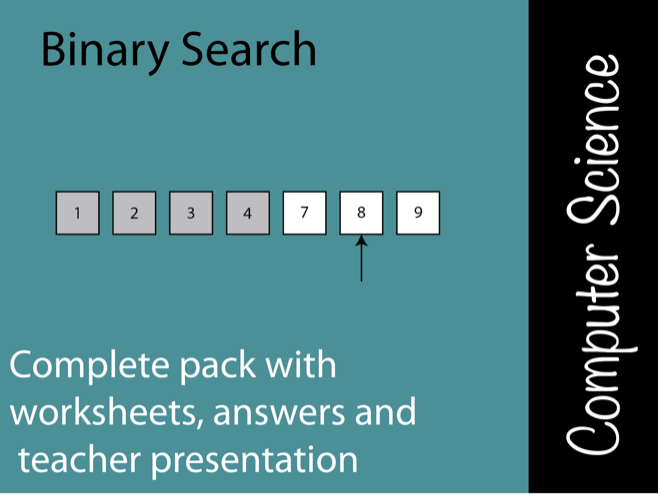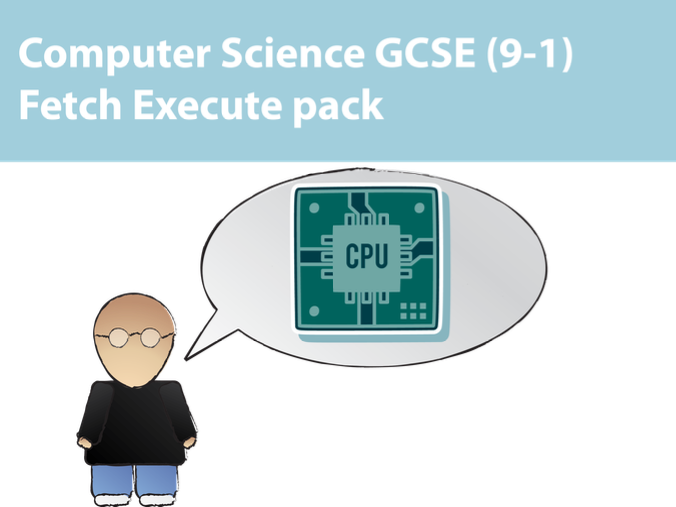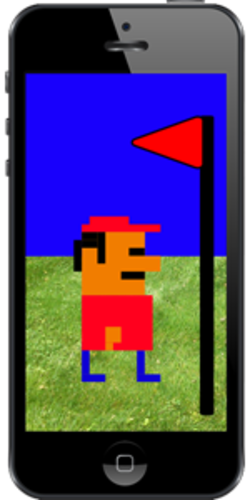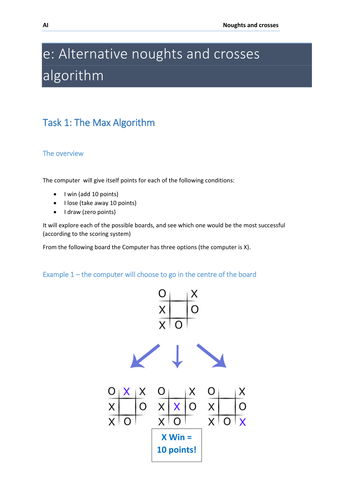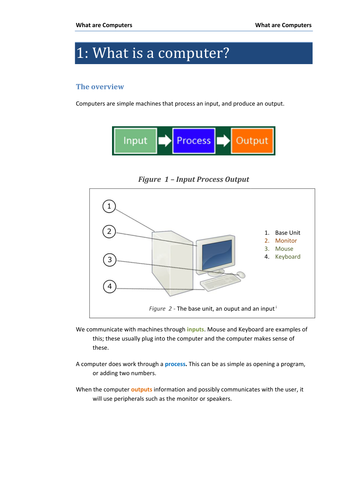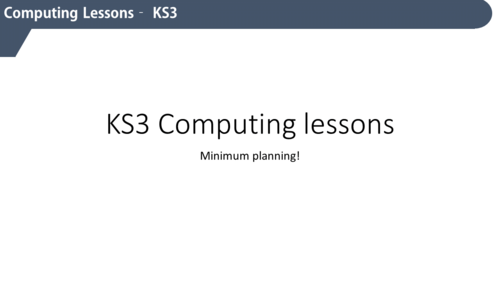
546Uploads
228k+Views
80k+Downloads
Computing

The Easter Bunny website (HTML) Computer Lesson
A complete Easter session (could be a lesson, could be longer if you wanted) to get students to create a website.
Full instructions provided - give them the files and the booklet and go. They love changing the text and images and it’s all related the the computing curriculum!
Great for GCSE classes but can equally be used for KS3 as all the materials are there to be used; no teacher prep!
No special software required, uses Notepad and Internet Explorer (all Windows computers have these installed).

Python Pair Programming activity for AQA GCSE Computer Science
Python Pair Programming activity for AQA GCSE Computer Science
Based around the game "rock paper scissors", and students develop solutions in pairs, share their results and criteria against the exam board requirements.
This lesson can also be run with a high ability Key stage 3 group.

Variables practical for GCSE Computer Science using Python
Teaches students about variables. They study assignment and make sure that the variables are printed to the screen, using a variety of paradigms.
This resource uses Python version 3.4

Google skills for KS3
Two lessons for KS3 around improving Google skills.
Can be used as cover lessons, or to help you expand student's knowledge of the world's most popular search engine.

Files theory for GCSE Computer Science
Teaches students about basic file handing including the basic operations; open, read and write.
This resource is not based on any particular programming language, so is applicable for any particular language you choose.

Algorithms sorting and searching (inc. Bubble sort) for KS3 and KS4
Worksheet is used for comparing algorithms.
This is a very good introduction featuring links to online resources, and is a great way for the students to be active while learning this important set of concepts.

Brexit and Computer Science Legislation
Computing teachers now have a resource for both British values and for ethical, legal, cultural and environmental concerns, related to Brexit and also teaching the Computer Science legislation required by courses.
I would start students off with the pair work of News1 and News2 as a discussion task.
You can then run through the presentation, and then there is a discussion tasks.
Students take the worksheets (starting with Discussion in the file name) and then map the issues that Brexit might cause onto them. They can be provided with information about the various legislation that they need to study (Starting with FactSheet in the file name)
OCR's GCSE Computer Science specification (9-1) J276 requires students to discuss Computer Science technologies while considering:
Ethical issues
Legal issues
Cultural issues
Environmental issues
Privacy issues
And legislation relevant to Computer Science:
The Data Protection Act 1998
Computer Misuse Act 1990
Copyright Designs and Patents Act 1988
Creative Commons Licensing
Freedom of Information Act 2000

Representing Algorithms - The Fundamentals - COMPLETE UNIT - GCSE Computer Science Resources
Highly recommended algorithms pack for GCSE - workbook, lesson plan, worksheets, posters and more!
Suitable for teachers of GCSE, and will be of particular interest to PGCE students, NQTs or departments that need that little bit of support in the delivery of this challenging qualification.
You get high quality original resources that are both class-tested and lesson ready. You may of course alter and modify the resources for your class, and you get my support for the lessons (worksheets have been developed for customers and added to packs in the past).
Use the completely free (forever) workbook available at https://tinyurl.com/y2xld5az
This pack includes a full set of supporting worksheets.
Posters:
PseudocodePoster
PseudocodePoster2
Lesson Plans:
Introduction to algorithms
Algorithms in depth: Abstraction and Decomposition
Extending your knowledge of algorithms
The 30 second lesson plan
Worksheets:
What are abstraction terms
What are algorithms Matching (+ Answer key)
FlowChartShapes (+ Answer key)
PMIChart
Flowcharts (+ Answer key)
DecomposeShopping
AbstractionMap
AbstractionOrDecomposition
What is abstraction
AbstractionOrDecomposition
AbstractionCreating
AbstractionProblem
DecompositionProblem
Tellanabstractionstory
Brainstorm (+ suggestions)
Voting activity:
YesNoVotingCards
AgreeDisagreeVotingCards
AlgorithmsVoting
Extras:
The 30 second lesson plan (for teachers in a hurry!)
Support - how to contact me for help (I can’t guarantee instant help, but I’m here for you!)
Workbook Table of Contents:
Definitions
Algorithms
Pseudocode
Flowcharts
Comparison of pseudocode and flowcharts
The Tools to help us solve problems
Decomposition
Abstraction
Teaching requirements:
It would be beneficial to read through the workbook and lesson plan before attempting to deliver the material. Enclosed is a 30-second quick start guide if you do not have time for this.
Unusual software requirements
None
Need some help?
Contact me! https://twitter.com/studeapps
Looking for the usual software requirements: (http://studeapps.com/usual-software-requirements):

Regular expressions for GCSE and A level computing
An introductory presentation and worksheet (with answers!) that can be used for GCSE students or, likely, A-level students.

Dijkstra's Algorithm for Computer Science
Dijkstra’s Algorithm
The way I would run this is to talk through the motivation for the algorithm from the presentation, and give the terminology worksheet to be filled in (answer in the presentation). We’d then work through the brute force worksheet. I might then run through the example, then give them the simple graph to fill in. Than we would work through TaskGraph1 for the graphs. Then I might get them to either code, or come up with graphs for them to solve in small groups or in pairs.
Included:
TPT presentation
Labels to fill in worksheets to give structure for the students to fill in answers
TaskGraph1 3 graphs to run Dijkstras on.
AnswerGraph1 and 2 -answers for the graphs
Brute force worksheet and brute force worksheet answers

Binary Search full lesson
A full lesson for Binary search.
The intention is for you to run through the presentation with the basics of the algorithm.
The resources are not language dependent (although the coding challenge does have a solution in Python, this is easily changed to your language of choice)
Students then have arrows cut out of ArrowsActivityResources.docx and record the algorithm stepping through numbers.docx
The students then optionally step through NamesToSearch.docx
Students then code TaskPseudocodeGuessingGame.doc
Then students should be able to code the binary search algorithm!

Fetch Execute Cycle Revision Pack for OCR Computer Science
Complete revision pack for Storage. Designed for OCR Computer Science (9-1) J276 but is more than useful for Computer Science students studying AQA and other exam boards.
Contains a revision booklet for the students to read and comprehend.

Hardware devices for As Computing
Presentation and activity for 3.2.4 Hardware Devices for the specification AQA 2510.
May be suitable for other specifications.
Bundle

Learning ICT and Computing with Mario Run
Resources that can really bring learning to life, based around the Mario franchise.
Bundle

Python Love (Valentines day bundle)
Three great activities for use with Python.
Based around valentines day - have fun with your class!

MiniMax algorithm for KS3 / GCSE / A-level
A lesson that can really stretch able students and discuss the MiniMax algorithm based around a naughts and crosses game.
This worksheet needs to be completed on a computer as the students will drag and drop the playing pieces on the worksheet.

Easter Bunny Newsletter with Publisher (Computing or IT KS2 / KS3)
Create a newsletter from Easter Bunny with Microsoft Publisher. Full instructions provided, works on both ICT and English skills for a fun session! Make sure the students have access to the instruction sheet (included).
Give them the instructions, show them the example and they’ll have enough for a lesson or two’s work.

Computer Hardware KS3 Worksheet set
Four lessons worth of worksheets for a hardware unit aimed at KS3 students.
Full of activities and fun for your students!

15 Complete KS3 Computing lessons
15 complete computing lessons ; the idea behind these are that you can just take them and deliver them.
Ready to go! Complete with worksheets for the students. Fully aligned to the KS3 Computing curriculum.
Lessons included:
- Artificial intelligence
- Cinema challenge
- Database challenge
- Die Hard puzzle
- Einstein’s riddle
- E-safety
- Google Search
- Hardware
- The Law
- Robotics
- Tablet Design
- Theme Park
- Website comparison
- Boolean Logic
- Programming
- Software Piracy
Topics covered:
Computational abstractions
Key algorithms
Programming
Boolean logic
Hardware and software
Instructions within a computer system
Data storage
Creative projects
Digital artefacts
E-Safety


